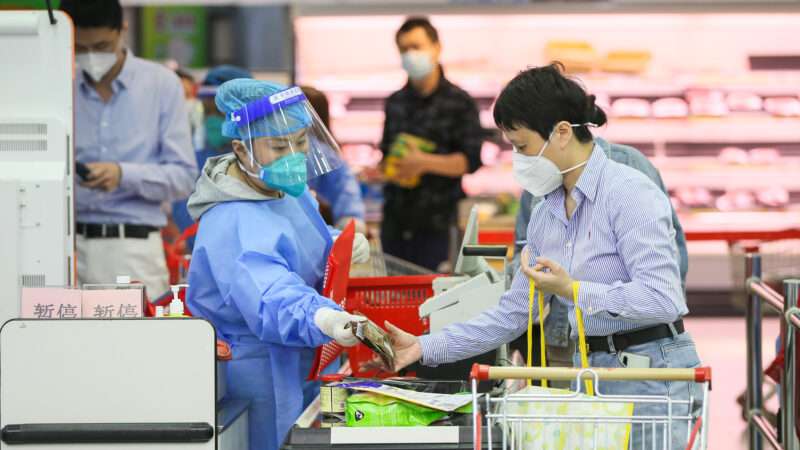
Imagine spending all of April and May and part of June under what could essentially be called house arrest, more than two years after COVID-19 was first detected and more than a year after you were vaccinated against the disease.
Shanghai's 25 million residents don't need to imagine. Suffering under their government's "COVID zero" policy, millions of people have been forced to abstain from in-person school and work, in some cases barred from leaving their apartments to get fresh air (depending on level of contagion within their residential area). Their food stock has dwindled and, in some cases, they've been carted off to ill-equipped central quarantine facilities. In the worst cases, they've lost family members to the virus. In a few highly publicized cases, family dogs were slaughtered in the streets by quarantine workers, either out of fear that dogs might spread the virus or a sense that the dogs will die from starvation anyway, with their families placed in central quarantine.
Now, authorities say there have been several consecutive days with no new COVID spread in Shanghai (outside of people who have been placed in government-run quarantine facilities). That will allow restrictions to soon be eased, with normal life likely to resume by mid-June. This is welcome news to the many people who have had their freedoms stripped away in the name of public health, but restrictions will remain in the interim. "Residents must produce a pass to get out of their compounds and can only leave by bike or on foot," report Charlie Zhu, Dong Lyu, and Daniela Wei at Bloomberg. "The passes are distributed to each apartment by residential committees, allowing one person per family to leave during appointed hours for grocery errands…most compounds will allow residents to leave twice in the next four days, for a maximum of four hours per trip."
"After being barricaded inside my housing complex for 53 days, including more than 40 days in my apartment, getting a taste of freedom was sweet and memorable," writes Charlie Zhu, a Shanghai resident, for Bloomberg. But restrictions were still in place: Most people are still limited to "essential" errands, like grocery shopping. Subways and buses have largely stopped running, and most private cars remain banned from city streets. "Restaurants and shops along the street were mostly closed and sealed with tall, blue plastic fences," writes Zhu, noting that the financial district of the formerly bustling city could best be described as a "ghost town." Other residents are more cynical, frustrated by the half-measures and filled with fear that even the tiniest increase in cases could spark a return to the draconian lockdowns they just endured. "How am I supposed to believe you after all the lies that you've told?" a Weibo user wrote online in response to the deputy mayor's COVID-rollback announcement, according to SupChina. "Realizing that China isn't in a hurry to plan for living with the virus instills a sense of dread in us," writes Shanghai resident Cameron Wilson for SupChina.
We don't know how what the COVID death toll has been with this most recent wave of infections due to the unreliability of Chinese government–provided numbers. And the people of Shanghai must now live with the fear that they could again be locked inside their residential compounds if case counts get bad enough. But even if they manage to avoid that fate, they must now deal with the economic fallout that follows when you shut down a city three times the size of New York for 2.5 months.
China's real estate industry, and the tax revenue it draws, have been hit hard by COVID policy and economic turbulence due to the recent rash of lockdowns. Over the first four months of the year, property development investment fell by 2.7 percent nationwide. "Income from deed taxes, which are paid when a property is bought or sold, fell 27.4%," according to SupChina, adding that land sales declined by 30 percent over the same time period compared to the preceding year. (The real estate slump is not solely attributable to COVID policy; more on that here.)
Other economic indicators look grim, too. The youth unemployment rate has remained high with about 16 percent of city-dwellers aged 16–24 unable to find work, while the general population unemployment rate hovers a little above 6 percent. Retail sales have contracted and industrial output has fallen.
The effects of the lockdowns have also been felt throughout the supply chain: Shanghai is home to the world's biggest port, but due to COVID policy, there's a line of 130 ships waiting in the port to unload their cargo—a much bigger backlog than is typical. "The repercussions have rippled across the globe, with multinationals from Apple, Tesla and General Electric, to Amazon, Adidas and Estée Lauder warning of disruption to their supply chains due to the lockdown of a city that handles 20 per cent of China's international trade," reports Financial Times. "In Shanghai, the average waiting time for import containers was 12.9 days on May 12, a 174 per cent increase on March 28, according to Project 44, the shipment tracker."
It's not just furniture, clothing, and electronics that might be affected by increasingly unreliable supply chains; U.S. hospitals report that they can't get an important dye used in medical scans to detect blockages in arteries and measure the growth of cancerous tumors. Between factory shutdowns, issues with truckers moving between cities and provinces, and port congestion, crucial goods have long been unable to reach their intended recipients.
China's pursuit of "COVID zero" has ended up fomenting distrust in government and quarantine workers, crippling key sectors of the economy, and snarling global supply chains. Can China keep its borders sealed semi-shut forever, or will it at some point regret having imposed cyclical lockdowns with no end in sight?
The post Shanghai Authorities Say Normal Life <i>Might</i> Resume in Mid-June. COVID Lockdown Started in March. appeared first on Reason.com.







